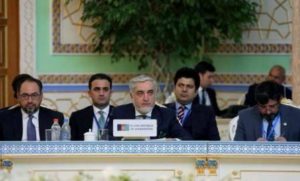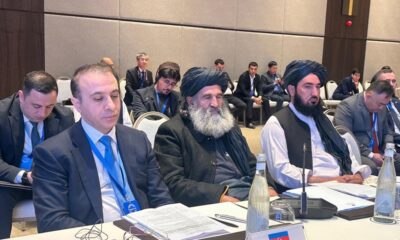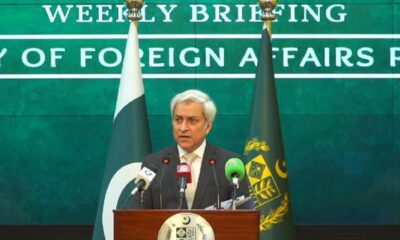Latest News
Abdullah Calls for Collective Efforts of Regional Countries in Fight Against Terrorism
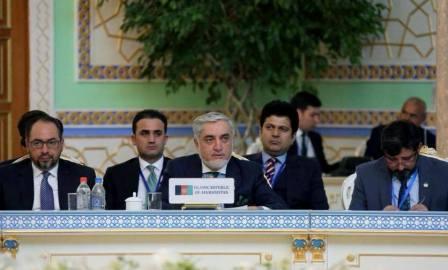
Addressing the 17th Shanghai Cooperation Organization (SCO) summit in Tajikistan on Friday, Chief Executive Abdullah Abdullah called for collective efforts of regional countries in the fight against terrorism.
Abdullah said that terrorism remains the biggest “collective” challenge in the region and that Afghanistan as a frontline state bears the bulk of the burden in the fight against terrorism.
“A common threat is the presence of sanctuaries and support networks bolstered by drug and smuggling funding systems that act as lifelines to most of these [terror] groups,” he said, adding that the Afghan government is working with all involved nations especially Pakistan to eliminate the infrastructure, financial and human resources, and logistics of the insurgent groups – destabilizing Afghanistan and the region as whole.
Abdullah stressed that terrorism continues to threat the social and economic development in Afghanistan and connectively across the region. He said among the international terrorist groups that since 2014 found hideouts in Afghanistan, is Islamic State or Daesh which the Afghan government sees it as a serious threat.
“We use all means to identify and deny their foothold inside our country. Most of their recruits are non-Afghans, they are opportunistic in their dealings and affiliations with other militant groups including certain Taliban groupings,” Abdullah said. “We continue to appeal to our regional friends by stressing that fighting terrorism, extremism, and separatism will require our collective efforts that need close cooperation and coordination.”
However, he said that they need to treat all forms of terrorism as one. “We cannot make the mistake of differentiating between good and bad terrorism,” Abdullah said.
Peace Process
Chief Executive Abdullah Abdullah also welcomed the multinational regional meeting on counter-terrorism at the level of national security officials that was held in Tehran last month.
He also appreciated the countries contributions being made through the Hearth of Asia – Istanbul, and Kabul Processes conferences.
“The National Unity Government in Afghanistan continues to promote an Afghan-led and Afghan-owned peace and reconciliation agenda,” he said. “Earlier, this year, we presented a comprehensive plan for reconciliation and reintegration that was supported by the international community. Meanwhile, we will defend our citizens, their rights and achievements when attacked.”
Abdullah said that the Afghan government has made every effort to provide an enabling environment for expanding the borders of trade, transit, communications, investment in energy transmission to better equip them to fight poverty and unemployment by bringing the different segments of the region close to each other.
In conclusion, he reiterated that Afghanistan is strongly committed to working closely with ECO to enhance cooperation in key areas of interest in order to pave the ground for a peaceful, stable and prosperous region.
Latest News
Crossing closures put $200 million in Pakistan’s medicine exports at risk
With exports to Afghanistan largely halted, manufacturers warn they are facing mounting financial losses—many of which may soon become irreversible.

Frequent closures of the Pakistan–Afghanistan crossings have brought pharmaceutical exports to a standstill, putting nearly $200 million worth of medicines at risk, industry officials warned on Friday.
Hundreds of trucks carrying antibiotics, insulin, vaccines, cardiovascular medicines, and other essential drugs are stuck at the Torkham and Chaman crossings, as well as at dry ports and warehouses across the country. One pharmaceutical company reported that Rs850 million worth of products were stranded, while more than 50 firms are facing similar setbacks.
Tauqeer ul Haq of the Pakistan Pharmaceutical Manufacturers Association (PPMA) described the shutdowns as a “structural threat” to the sector. He noted that Afghanistan remains Pakistan’s largest overland trading partner and a critical transit corridor for exports to Central Asia, including Uzbekistan, Tajikistan, Turkmenistan, and Kazakhstan.
Industry representatives say the disruptions are hampering regional connectivity initiatives such as the Pakistan-Uzbekistan-Afghanistan railway, damaging temperature-sensitive shipments, and prompting investors to consider shifting to alternative trade routes.
With exports to Afghanistan largely halted, manufacturers warn they are facing mounting financial losses—many of which may soon become irreversible.
Latest News
Pakistan’s top general calls on IEA to pick between ties with Islamabad or TTP
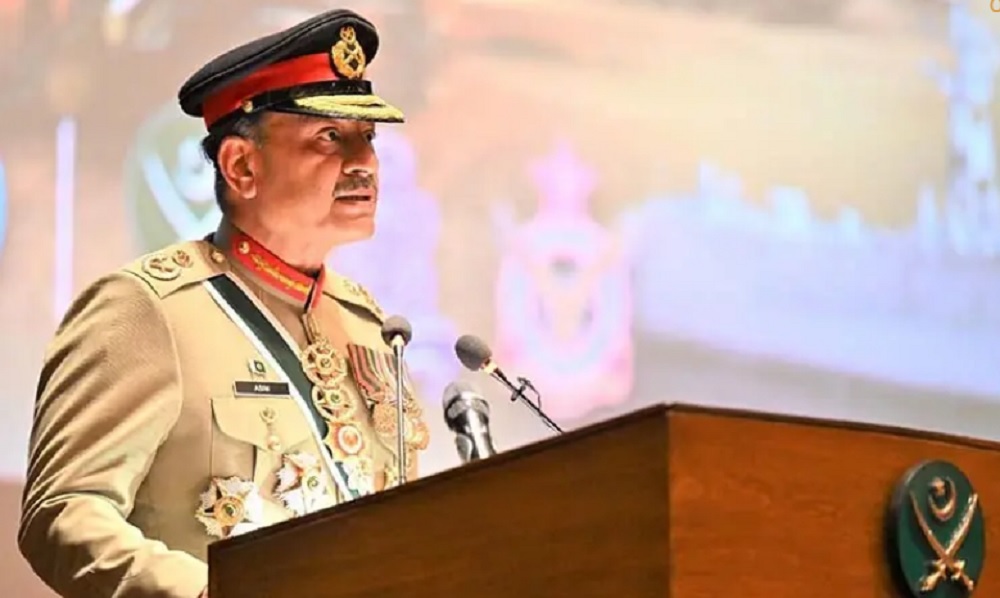
Pakistan’s newly appointed armed forces chief called on the Islamic Emirate of Afghanistan (IEA) on Monday to choose between maintaining ties with Islamabad or supporting the Tehreek-i-Taliban Pakistan (TTP).
Munir made his remarks at his headquarters in the garrison city of Rawalpindi, where he received a guard of honor from all three branches of the military, marking the launch of Pakistan’s new joint military command.
Munir said that the new Defence Forces Headquarters marks a historic step, creating a unified tri-services command to boost coordination across land, air, sea, cybersecurity and information domains amid rising security threats, according to a military statement.
Munir told officers that a “clear message” had been conveyed to the Islamic Emirate in Kabul that it must choose between Pakistan and the TTP.
The Islamic Emirate has not yet responded to Munir’s remarks.
Relations between Afghanistan and Pakistan have been deteriorating since October, when several days of fighting left dozens dead and hundreds injured.
Pakistani officials have consistently claimed that attacks in the country are being organized by militants based in Afghanistan. The Islamic Emirate, however, has rejected this claim and said that Afghanistan cannot be held responsible for Pakistan’s security.
Latest News
Mushroom harvest begins in Kandahar

In Kandahar, farmers who established mushroom farms with the support of international organizations have now begun harvesting their crops.
The Directorate of Agriculture, Irrigation, and Livestock of Kandahar stated that, as a result of its efforts and with financial support from the United Nations Office on Drugs and Crime (UNODC) and technical assistance from the Dutch Committee for Afghanistan, essential supplies worth $20,000 were distributed to 30 needy families in Khakrez district to establish mushroom farms. The harvesting process has now started.
Officials say the program aims to promote alternative crops to opium poppy, improve farmers’ livelihoods, introduce high-yield plants, and expand modern and standardized farming practices. According to them, each farmer can produce up to 10 kilograms of mushrooms in one month from just one kilogram of seeds at home—a process that is simple, low-cost, and highly profitable.
Mohammad Hanif Haqmal, spokesperson for the Kandahar Directorate of Agriculture, said: “For around 30 families, 23 types of tools necessary for mushroom farming were distributed. Seeds were also provided so they could establish farms and harvest crops. This is the first time mushroom is being cultivated in Kandahar. The Directorate of Agriculture will continue its efforts to promote this crop in other areas of the country so people can establish farms at home and increase their income. In Kandahar, the price of one kilogram of mushroom ranges between 350 and 400 Afghanis.”
Officials from the Dutch Committee for Afghanistan also confirmed that 23 types of tools and necessary materials for mushroom cultivation were previously distributed to the families, and the harvest is now underway. They consider the plant a suitable alternative to opium poppy and said they will continue supporting the farmers.
Abdulhadi Dawoodzi, representative of the Dutch Committee for Afghanistan in Kandahar, added: “We distributed 20 types of materials and tools necessary for planting and harvesting mushroom to 30 families, worth $20,000. This support serves as an alternative to opium cultivation.”
Farmers view mushroom as a viable substitute for opium poppy. They say the crop requires less effort and yields higher profits, making it a suitable option, especially during drought conditions.
Sibghatullah, a Kandahar farmer, said: “Mushroom can serve as a complete alternative to opium and hashish. Drought is intensifying every year, and this crop is a good substitute. We ask the organization to establish more farms and help market our products.”
Another farmer, Mohammad Naseem, added: “We can sell mushroom in local markets and to neighbors. Compared to opium and other narcotic crops, it is a better cultivation option.”
Officials from the Kandahar Directorate of Agriculture said that in recent months, they have increased efforts to identify and promote alternative crops and have implemented several programs to introduce high-yield plants suitable for Kandahar’s climatic conditions.
-

 Business4 days ago
Business4 days agoAriana Afghan Airlines boost air trade with arrival of new cargo aircraft
-

 Sport2 days ago
Sport2 days agoILT20: Nissanka fires Gulf Giants to four-wicket win over Dubai Capitals
-
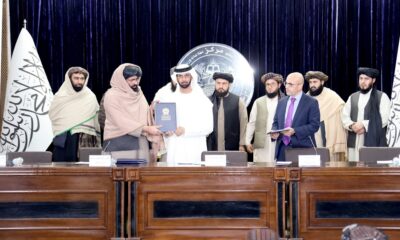
 Business2 days ago
Business2 days agoAfghanistan signs agreement with DP World to bolster ports infrastructure
-
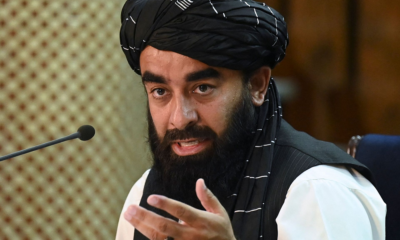
 Business5 days ago
Business5 days agoIEA demands assurances from Islamabad before trade routes reopen
-

 Latest News4 days ago
Latest News4 days agoIran offers fully funded virtual education for Afghan students returning from abroad
-
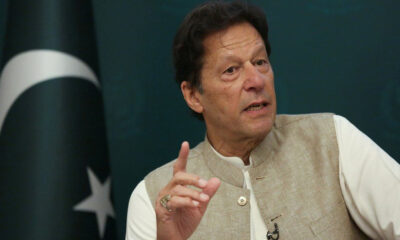
 Latest News5 days ago
Latest News5 days agoImran Khan accuses Army Chief of ‘igniting’ Pakistan–Afghanistan tensions
-

 Sport3 days ago
Sport3 days agoFIFA confirms all 12 groups for 2026 World Cup
-
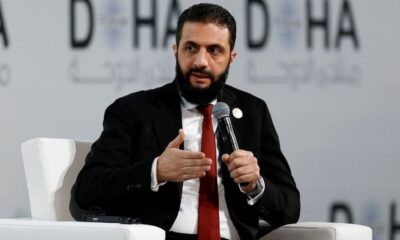
 Latest News2 days ago
Latest News2 days agoSyria’s President challenges West’s counter-terrorism claims in Afghanistan and Iraq

